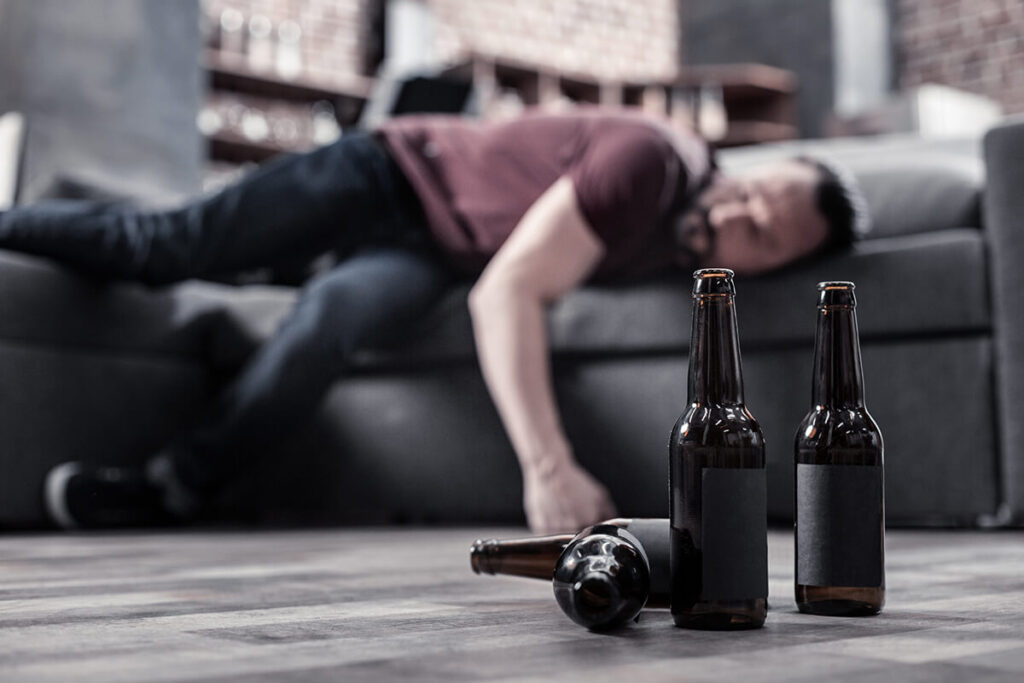Is alcohol a depressant? The answer to that question is yes. When you first consume alcohol, you’ll find many of your bodily systems slow down. You may have trouble thinking clearly, and your reflexes will slow due to a change in neurological chemicals. However, if you drink often enough that your brain becomes used to these changes, it may cause an addiction to alcohol. Addiction treatment centers provide treatment for alcohol addiction, helping recovering alcoholics to overcome their condition and move on past dependency. Is alcohol a depressant? Get answers by calling TruHealing Centers today at [Direct].
Is Alcohol a Depressant? The Answer is Yes.
There is a common saying regarding alcohol: “It’s gone to my head.” While this may be true in some sense, alcohol has a long way to go before it finally reaches your brain. Once alcohol reaches your stomach, nearly 20 percent of it is absorbed into your bloodstream. The rest ends up in your small intestine, where 80 percent returns to the bloodstream again. From there, the alcohol finally reaches your brain.
While this seems like a complicated process, it only takes 10 minutes. Once alcohol reaches your brain, it triggers a wide range of chemical reactions, including, but not limited to the following reactions:
The Release of Serotonin and Dopamine
Much of the reason why alcohol and drugs are popular is because of the changes they make in brain function – primarily the hallucinogenic or euphoric effects of the substances. The pleasure derived from drinking is caused by the mass release of the neurotransmitters, serotonin, and dopamine.
The Release of Gamma-Aminobutyric Acid (GABA)
GABA is an inhibitory neurotransmitter in the central nervous system. Its primary purpose is to reduce excitability in the nervous system. Large amounts of GABA can hinder cognitive ability, reasoning skills, and mobility. This is precisely what happens when you drink too much alcohol.
Reduction of Glutamate in the Body
Glutamate is a neurotransmitter that sends nerve cell signals to other cells. Glutamate is the chemical that you causes you to become excited and creates energy throughout your entire body. Alcohol drastically reduces glutamate in the body and slows down your body’s energy. This is why you feel relaxed or lethargic when you drink large amounts of alcohol.
At first, the body gets a charge of serotonin and dopamine. However, this is quickly overshadowed by large amounts of GABA and reduction in glutamate production. You go from a quick high to a long-lasting low.
As a result of these chemical changes in the brain, your reflexes and speech will significantly slow. If you drink so much that you suffer from alcohol poisoning, your blood flow and breathing will also become slower. This reaction can lead to unconsciousness and death if you don’t get treatment immediately.
Forming a Dependency on Alcohol
Substance abuse treatment programs often treat clients who form a dependency on alcohol. When a person drinks excessively, the brain becomes attached to the chemical reaction from the alcohol. Over time, the user either can’t or doesn’t want to stop drinking. They depend on alcohol to get through the day. As a result, they need to get professional help for alcoholism.
There are several different addiction treatment therapies for alcohol, such as:
- Cognitive-behavioral therapy
- Dialectical behavior therapy
- Individual and group therapy
- Holistic treatment and activities
- Detox, rehab, and aftercare programs
- Inpatient and outpatient treatment services
Regardless of the severity of the condition or how long a person has been drinking, the right treatment program can help them overcome their condition.
Get Help for Alcoholism at TruHealing Centers
Is alcohol a depressant? Find out more by getting help for addiction today. If you are struggling with an addiction to alcoholism, then contact TruHealing Centers. Our alcohol addiction treatment program can help you through every stage of recovery. Get a free consultation from a treatment specialist when you call TruHealing Centers at [Direct]. Let us help you get on the road to recovery.








